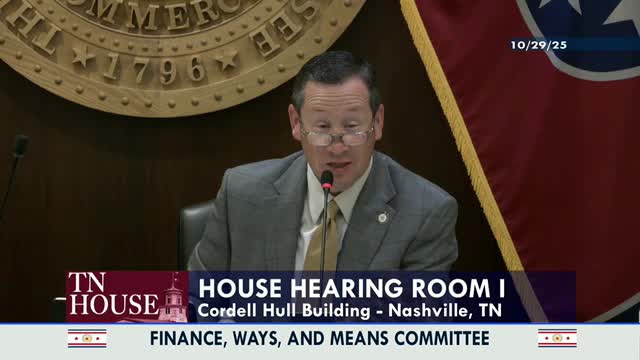TDOT says TMA and general‑fund transfers are driving record contract lettings; warns of post‑TMA funding gap
Get AI-powered insights, summaries, and transcripts
Subscribe
Summary
Tennessee Department of Transportation Commissioner James Reed told the Finance, Ways and Means Committee that recent one‑time and recurring state funding (TMA and general fund transfers) allowed the department to expand resurfacing, safety spot projects and begin major projects such as choice lanes and the King's Crossing bridge. TDOT said it is “
Commissioner James Reed of the Tennessee Department of Transportation told lawmakers on Oct. 29 that the agency is using recent state investments—including the Transportation Modernization Act funds and general‑fund transfers—to accelerate project delivery and roadway maintenance, but warned the state would return to lower historic letting levels once those one‑time resources are exhausted.
"We have the most ambitious program in TDOT's history before us," Reed told the Finance, Ways and Means Committee, describing a three‑part focus on program delivery, staff development and system modernization.
Why it matters: The committee heard how large, multi‑year investments have increased TDOT’s capacity to let major construction contracts, expand resurfacing and add spot safety work. Agency officials also flagged a long‑term funding shortfall once TMA and recent one‑time transfers end—an issue lawmakers will face in future budget cycles.
Key points
- Contract letting and program delivery: TDOT said it is on pace for its largest annual letting total in department history (approximately $1.9 billion in the current year). Commissioner Reed said the agency delivered roughly 100 percent of projects listed in its highway program in recent years after reorganizing project development processes.
- Use of one‑time state funds: Reed credited TMA dollars and general‑fund transfers with increasing resurfacing work (+50 resurfacing jobs in FY26) and funding 28 new spot‑safety projects (turn lanes, school‑entrance improvements) that yield high safety benefits per dollar. He noted a $200 million general‑fund transfer for Blue Oval‑related infrastructure and other targeted investments.
- Major projects: TDOT staff updated the committee on multi‑billion dollar efforts: the Choice Lanes on I‑24 (Nashville to Murfreesboro), where procurement is under way and commercial close is expected in the fall of next year, and the King's Crossing Bridge in Memphis—a roughly $1 billion‑plus project leveraging federal grant funding.
- Short lines, aeronautics and state aid: Deputy Commissioner Preston Elliott said recent non‑recurring allocations funded aeronautics runway work and a $85 million short line rail program; he warned that short‑line grants funded from a one‑time pool will exhaust by FY26 unless lawmakers provide recurring dollars.
- Blue Oval/Mega‑site: TDOT staff reported wastewater and water treatment plants at the mega‑site are operational; much of the required on‑site infrastructure is complete though some rail spur and final elements remain dependent on OEM timelines. The department said the 37 positions funded to support the mega‑site remain dedicated to that work for the near term.
Questions from lawmakers
Lawmakers pressed TDOT on staffing and retention: the agency raised pay and returned some positions, improving recruitment and reducing turnover from nearly 17 percent to under 5 percent, the commissioner said. Reed and deputies also emphasized the importance of state funding flexibility: federal dollars are restrictive on eligibility and strings attached, while state funds give the agency discretion to address local priorities (maintenance, guardrail, snow removal) not always fundable with federal money.
TDOT cautioned that once TMA and recent one‑time transfers are exhausted the department’s annual contract letting would revert to roughly 2018 levels unless the state adopts a new funding approach. Reed urged the state to consider revenue options and flexibility as the state plans for long‑term growth.
Ending: TDOT pledged to continue delivering projects efficiently and to provide follow‑up as requested; lawmakers indicated interest in further discussions on revenue options to sustain higher delivery levels.
